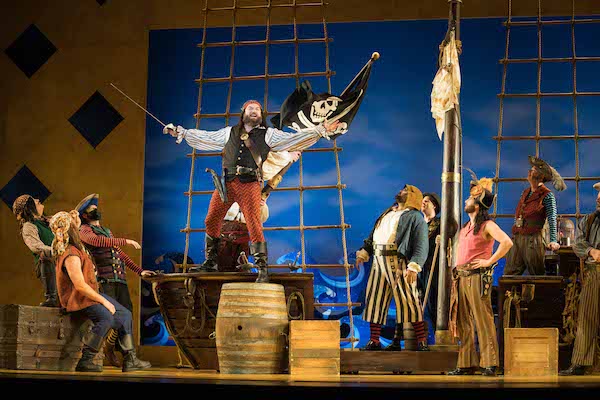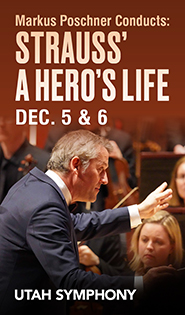Utah Opera wraps season with an exuberant “Pirates of Penzance”

Utah Opera’s current season—its first live operas since the beginning of the Covid-19 pandemic two years ago—started with a comedy and is ending with a comedy.
Like its zany production of Rossini’s Barber of Seville last September, Utah Opera’s clever, exuberant staging of Gilbert & Sullivan’s Pirates of Penzance, which opened Saturday, filled a communal need to laugh in troubled times. The show also demonstrated that it’s possible to be uproariously funny while staying true to the spirit of a classic operetta.
Pirates performed by an opera company is a different experience from Pirates performed by a theatre company. A central delight of the show is hearing Sullivan’s refined, often gorgeous melodies pressed into the service of broad farce, and it’s more effective with operatic voices singing those melodies.
Making his Utah Opera debut, John Riesen was perfectly cast as Frederic, the orphan who was mistakenly apprenticed as a child to the leader of a band of tender-hearted pirates (his hard of hearing nurse was instructed to apprentice him to a “pilot”). As an apprentice he had felt duty-bound to assist the pirates in any way possible, but once released from his apprenticement, that same sense of duty compelled him to exterminate them.
Riesen’s expressive voice was mannered in just the right way to reflect Frederic’s self-righteousness, and as an actor, he fully committed to being the “slave of duty.” The seriousness he brought to his character’s moral dilemma propelled the show forward and heightened its humor. He also had genuine chemistry with Madison Leonard, who was a stunning as his beloved, Mabel.
Leonard’s clear coloratura glided effortlessly over her melismatic entrance, and her rendition of “Poor Wandering One” was spellbinding. Her natural charisma was equaled by her comic timing; late in the second act, when Frederic asked her to wait an additional 60 years for him, her slight pause before noting that it was a really long time, prompted a huge laugh.
Like Riesen, she committed to her character’s motivation with utmost seriousness. Not only did this make the comic moments ring more true, but it gave the actors license to employ all the artistry at their disposal to the sublime duet “Oh, leave me not to pine” which was a high point of the show.
One of the production’s few vocal disappointments was a number that is usually show-stopper: “I Am the Very Model of the Modern Major General,” which Hugh Russel, in the eponymous role, performed too fast and with nearly unintelligible diction. Other than that, Russel turned in a delightful performance, capturing his character’s ridiculous self-importance and acquitting himself well vocally elsewhere.
Led by Kevin Nakatani as the Sergeant of Police, the policemen were one of many delightful ensembles, turning in charming renditions of “When the Foeman Bares his Steel” and “When a Felon’s Not Engaged in his Employment.” Nakatani delivered the former convincingly, in a clear bass with a slight Scottish accent, with trepidation clearly showing on his face and in the way he and his cohort marched stiffly in time with their “taran-tara’s.” Instead of the abstract silliness with which some productions portray the policemen, Nakatani and his crew found the truth of their characters, as timid, tenderhearted bureaucrats facing an unpleasant duty, which added to teh charm and hilarity of the production.
The same could be said for Craig Irvin as The Pirate King. He wore red-striped tights, a coat with tails, and a giant top-hat and delivered “Oh Better Far to Live to Live and Die” with swashbuckling panache, but underneath the trappings of piracy was a decent fellow who had made a moral choice to become a pirate and who had genuine concern and affection for his apprentice Frederic.
As Ruth, Meredith Arwady sang “When Fredric Was a Little Lad” with crisp, exaggerated diction and equally exaggerated gestures, which matched the rhythm of the song. Her impressive contralto voice filled the hall and handled the phrasing with aplomb. She also displayed keen comic instincts in the next scene, in “Oh False One You Have Deceived Me,” as her character tried to stay chipper while absorbing Frederic’s harsh appraisal of her appearance.
Some opera companies give in to the same temptation as community theatre troupes to add extra bits of comedy that detract from the humor that is already inherent in Gilbert’s libretto. (Making the Pirate King a klutz who keeps stabbing himself seems to be a favorite—thank you Kevin Kline.)
Director Kyle Lang wasn’t above comic embellishments and a few cheap laughs in Utah Opera’s production. In addition to dozens of silly sight gags, Saturday’s performance inserted jokes about Covid testing and sister missionaries. However, the gratuitous comic bits mostly grew out of the plot and characters, and accentuated the show’s innate humor rather than working against it. Lang paid attention to the music, which was always reflected in he cast’s movements. This was particularly true in the ensemble numbers.
The sets and costumes, designed by James Schuette, were what one might imagine at the opera’s premiere in New York City in 1879. A giant gold medallion with a skull and cross bones was fastened to the top of the red velvet curtains, which opened onto an unremarkable, three-sided ship with an oversized pirate flag. Crudely painted blue waves on plywood denoted the ocean and a few rocks and pieces of vegetation on the yellow and white checkerboard floor denoted the beach. The graveyard comprising the second act featured headstones made of Styrofoam or foam rubber, which the characters moved as needed to hide themselves. On the whole, the effect was charming, demanding just enough imagination from the audience and reminding them that this was farce, not serious drama.
Conductor Gary Thor Wedow, who also conducted the season-opening Barber, did an admirable job in the pit, setting the tone with the opera’s beguiling overture, capturing the spirit of work with conscientious phrasing and crisp articulation. His tempi were free, allowing singers to speed up or slow down as called for by the action on stage. As mentioned above, there were moments of sublime musicality, including Frederic and Mabel’s duets, which Wedow led with subtlety and sensitivity.
The Pirates of Penzance continues through May 15. utahopera.org


